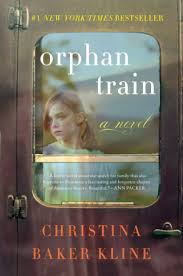 Recently, I attended a Dallas Museum of Art “Arts & Letters Live” event featuring author Christina Baker Kline. The event focused on Kline’s newest novel, A Piece of the World, about the relationship between the famous painter, Andrew Wyeth, and his muse, Christina Olson. I haven’t read the book yet (have an entire to-be-read shelf), but I wanted to take the opportunity to say a few words about Kline’s previous bestselling novel, Orphan Train, one of my favorite books over the past couple of years.
Recently, I attended a Dallas Museum of Art “Arts & Letters Live” event featuring author Christina Baker Kline. The event focused on Kline’s newest novel, A Piece of the World, about the relationship between the famous painter, Andrew Wyeth, and his muse, Christina Olson. I haven’t read the book yet (have an entire to-be-read shelf), but I wanted to take the opportunity to say a few words about Kline’s previous bestselling novel, Orphan Train, one of my favorite books over the past couple of years.
Orphan Train is based on a long-forgotten episode in our country’s history. From 1854 to 1929, orphaned or abandoned children were taken by train from the East Coast to the Midwest to be adopted, which usually meant working on a farm or some other form of servitude.
It was a hard life for these children, which Kline illuminates so vividly in her novel. She intertwines the lives of two women: 91-year-old Vivian, an orphan train rider taken to Minnesota in 1929, who eventually retires in Maine, and 17-year-old Molly, a troubled foster child assigned to a community service project with Vivian to avoid juvenile detention.
While the characters are fictional, the events Kline depicts are tragically all too true. More than three million copies of Orphan Train have sold, and it’s easy to see why. Great storytelling attracts readers, but I believe there’s also something else at play.
I agree with Elizabeth Gilbert’s theory, laid out in Big Magic, that ideas are constantly swirling around us “searching for available and willing human partners.”
There are people who have passed on who want their stories told, and whose lives may be bundled up under a major event, like the orphan trains.
Kline stumbled upon this part of America’s history during a family vacation to North Dakota, in a local historical society’s nonfiction book on the subject.
The story was waiting to be told, and fortunately, Kline accepted the invitation to inspiration.